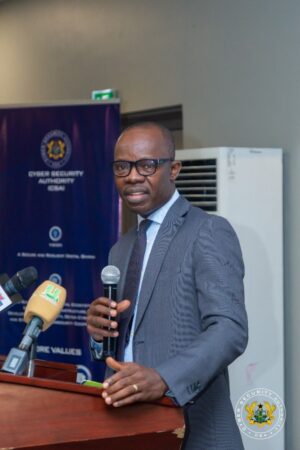The exercise of protecting and educating children on online best practices is not the sole responsibility of the government, but all stakeholders including parents, teachers, the media, and Civil Society Organisations (CSOs).
The Ag. Director-General of the Cyber Security Authority (CSA), Dr Albert Antwi-Boasiako, said this in an opening address at the Civil Society Organisations Forum for the validation of the Child Online Protection Framework, held in Accra on Tuesday, July 5, 2022.
He called on CSOs to be accountable for getting the message of child online protection and other regulations to the public. He said the role of CSOs in the development of the Child Online Protection Framework cannot be overemphasized, and the job of ensuring the safety of children is a civil society mandate. “You must own this process, you are on the ground’ as you hold the government accountable as an enabler of cybersecurity, you must in return be held accountable for your responsibility to spread the word” to the people, he added.
The Ag. Director-General of the CSA added that Government has put the structures in place through the passage of the Cybersecurity Act, 2020 (Act 1038) and other initiatives which led to an ITU ranking of 86.96% in 2020 from an earlier ranking of 32% in 2017 with respect to cybersecurity readiness; it is now time for operationalisation and implementation which requires active collaboration by all stakeholders.
Mrs Florence Ayisi Quartey, Ag. Director for the Department of Children, Ministry of Gender, Children and Social Protection, said a study conducted by the Ministry showed that nine in ten children had been on the internet before, either for information or recreation.
She urged CSOs to share data and information on child cybercrime issues with the government through the CSA to be captured in the national data for decision making. She also called on them to work with the CSA to finalise the national COP framework and ensure its implementation.
Mr Emmanuel Nyarko Tetteh, a representative of UNICEF said, the risk of online child abuse is on the rise, and they are happy with the validation forum to enable the relevant inputs to enrich the document for implementation. “UNICEF is happy with the provisions of the Cybersecurity Act, 2020 and Ghana’s efforts in child online protection and would continue to give more support to the government in that regard”.
The Israeli Ambassador to Ghana, Mrs Shlomit Sofa, in a brief comment, called for collaboration from all stakeholders to reach out and protect all children.
According to the Head of Child Online Protection at the CSA, Madam Afua Brown-Eyeson, the objective of the event was to strengthen the foundation of the framework, create awareness among policymakers, industry players, parents, and educators as well as children and young people, and to develop practical tools and procedures to help minimize the risks children face online. She educated the participants on the child online provisions in Act 1038 which criminalises various child online abuses.
The National Child Online Protection (COP) Framework is aimed at tackling the incidents of Child Online Sexual Exploitation and Abuse including child sexual abuse material, online harassment, and cyberbullying against children, as well as preventing inappropriate collection and possession of children’s data by service providers. The framework adopts the six (6) main themes of the WeProtect Global Alliance Model National Response which are: policy and governance, criminal justice, victim, societal, industry, communication, and media.













